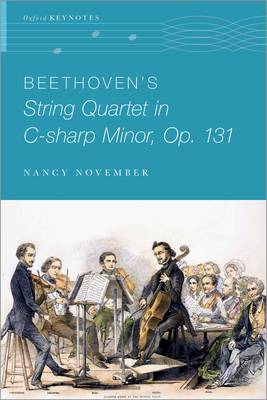
Je cadeautjes zeker op tijd in huis hebben voor de feestdagen? Kom langs in onze winkels en vind het perfecte geschenk!
- Afhalen na 1 uur in een winkel met voorraad
- Gratis thuislevering in België vanaf € 30
- Ruim aanbod met 7 miljoen producten
Je cadeautjes zeker op tijd in huis hebben voor de feestdagen? Kom langs in onze winkels en vind het perfecte geschenk!
- Afhalen na 1 uur in een winkel met voorraad
- Gratis thuislevering in België vanaf € 30
- Ruim aanbod met 7 miljoen producten
Zoeken
Omschrijving
Beethoven's String Quartet in C-sharp minor Op. 131 (1826) is not only firmly a part of the scholarly canon, the performing canon, and the pedagogical canon, but also makes its presence felt in popular culture. Yet in recent times, the terms in which the C-sharp minor quartet is discussed and presented tend to undermine the multivalent nature of the work. Although it is held up as a masterpiece, Op. 131 has often been understood in monochrome terms as a work portraying tragedy, struggle, and loss. In Beethoven's String Quartet in C-sharp Minor, Op. 13, author Nancy November takes the modern-day listener well beyond these categories of adversity or deficit. The book goes back to early reception documents, including Beethoven's own writings about the work, to help the listener reinterpret and re-hear it. This book reveals the diverse musical ideas present in Op. 131 and places the work in the context of an emerging ideology of silent or 'serious' listening in Beethoven's Europe. It considers how this particular 'late' quartet could speak with special eloquence to a highly select but passionately enthusiastic audience and examines how and why the reception of Op. 131 has changed so profoundly from Beethoven's time to our own.
Specificaties
Betrokkenen
- Auteur(s):
- Uitgeverij:
Inhoud
- Aantal bladzijden:
- 152
- Taal:
- Engels
- Reeks:
Eigenschappen
- Productcode (EAN):
- 9780190059217
- Verschijningsdatum:
- 28/05/2021
- Uitvoering:
- Paperback
- Formaat:
- Trade paperback (VS)
- Afmetingen:
- 137 mm x 208 mm
- Gewicht:
- 181 g

Alleen bij Standaard Boekhandel
+ 74 punten op je klantenkaart van Standaard Boekhandel
Beoordelingen
We publiceren alleen reviews die voldoen aan de voorwaarden voor reviews. Bekijk onze voorwaarden voor reviews.









